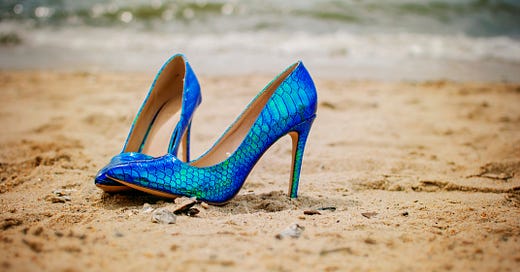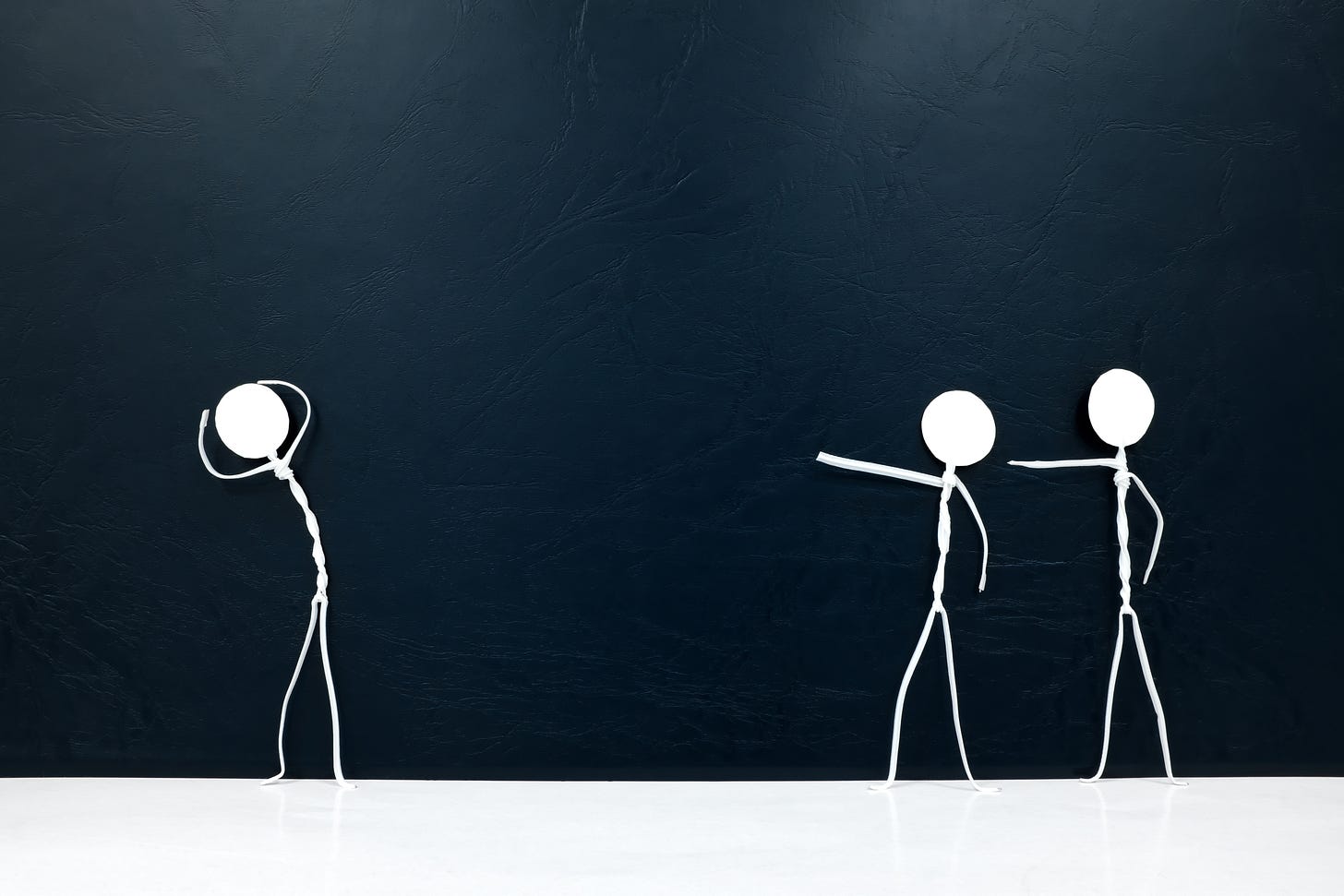I’m currently isolating in bed, on day seven of a second bout of Covid. I’m confined to my room so I don’t infect others. In conjunction with recent events in the grassroots feminist Twittersphere, somehow this experience is putting me in mind of a different kind of presumed infection: the implication of guilt-by-association. When you wield guilt-by-association as a weapon, or feel this kind of guilt yourself, the charge is that there has been association with Bad People, and that an infection has occurred as a result. And it might be contagious.
I’ve witnessed the operation of this critique in various settings for a few years now. It is often used against supporters of my academic freedom, both to criticise them for associating with me and to deter others, so naturally I have a personal interest in examining its structure. Here, for instance, is University of Ghent Professor of Philosophy Eric Schliesser criticising an academic organisation for inviting me to give a talk, thereby suggesting that there is a “debate with sides” here, something which he describes as “not a neutral act”. Here’s another philosophy professor, Mark Lance, writing in Inside Higher Ed and criticising 12 fellow philosophers who had signed a letter in favour of my academic freedom, comparing the signatories to those who would defend the permissibility of arguing that Native American people were “the devil, likely lacked souls, were more akin to beasts than humans and absolutely must be at least converted, and if not, removed (i.e. killed)”. And here’s academics Robin Dembroff, Rebecca Kukla, and Susan Stryker ostentatiously withdrawing from an online symposium at the Institute of Art and Ideas when they realise that they had been, in their words, subject to a “non-consensual co-platforming” with me and others. In each of these cases, there is an attempt to demonstrate the guilt of those who would associate with me - even where the associates in question have been careful to specify that they do not agree with me about the perniciousness of gender identity ideology.
But I also see guilt-by-association used by feminists against other feminists. And indeed I have used it in the past myself. Within left-leaning feminism, as within the Left generally, it is a heavily used tool. There is sharp criticism of any feminist who would associate for strategic reasons with those on the Right, and in particular with the Christian Right in the US. After the recent Supreme Court decision on abortion, this dispute has been reignited online - and then some. Readers who keep up with internecine feminist wars will know who and what I’m talking about, and for those that don’t, it doesn’t matter. My point is not to get caught up in specifics. In a way that is what the hovering threat of guilt-by-association wants me to do – to justify, explain, exculpate particular people, or myself. But I feel no guilt. My aim instead is to examine the structure of this kind of accusation, and what it might mean.
It’s important to notice that the person criticised for their associations - call this person “the Associate”- doesn’t have to share the character flaws or disgraceful opinions of the people with whom she associates, in order to be subject to critique. In fact, in most cases it is probable that the case against the Associate in this respect is at least unproven. For if she obviously did share those flaws or opinions, there would be a much quicker and more direct route to criticism of her, simply by pointing this out. Still, though, as my opening analogy suggests, I suspect that this reasonable point is often hidden in the visceral images of infection, contagion, and contamination in the emotional driving seat.
Sometimes guilt-by-association is even supposed to operate at several removes. For instance, this article (hosted by an organisation I vehemently support, written by a woman I respect) posits guilt-by-association for those UK feminists who associate with US feminists who associate for strategic reasons with the US religious right (= two removes). And it also posits some guilt-by-association for “a larger group” in the UK, who “whilst having no such links, either endorse this strategy or refuse to acknowledge it exists” (= three removes). That this larger group of women apparently should be deemed somewhat guilty for “refusing to acknowledge” the existence of the guilt of those with whom they associate is a further characteristic feature of this style of manoeuvre. In a moral universe in which guilt is presumed to travel fast as lightening, failing to publicly disassociate yourself from what others deem to be bad behaviour is also treated as deserving of some penance.
Perhaps it isn’t surprising that attempts to induce guilt-by-association often try to collapse the moral gap between Associate and those with whom she associates. Generally speaking, inducing guilt in another person doesn’t tend to be a particularly rational process. Despite this, I would still like to consider the matter from a rational point of view.
Share Kathleen Stock
The first thing to notice is that an ambiguity is built into many discussions – is the problem supposed to be simply associating with Bad People privately or doing so publicly? If it was the latter, this presumably would leave room for backroom associations, collaborations, and deals, where these are judged to be strategic. So I’ll take each possibility in turn, starting with private associations.
At the extreme end, there is sheer revulsion at the thought of associating with someone, even only privately, who is assumed to be completely and utterly evil. You should not associate with completely and utterly evil people, in any capacity. Ever. Case closed.
I do not disagree with the general premise here, but clearly this argument is a sledgehammer when applied to many people on the Right. In a great book called The Dark Knight and The Puppet-Master, Chris Clarke documents how the Left tends to be susceptible to the fallacious guiding myth that a sliding scale operates between Left and Right, coinciding with one between Good and Bad. (Take a wild guess at who the good ones get to be.) This view has been expressed to me sincerely many times, most boldly by a university colleague and former friend who once told me that the more left-wing someone is, the nicer they are. After four years of being defamed unfairly, mostly by lefties, mostly for reasons of social capital – including by the bloke that originally said this to me – I can tell you categorically that this is false.
Not only does the Dark Knight myth romanticise those on the Left, it unfairly demonises many on the Right, who are acting out of their own set of positive values, however (one may judge) incoherently or imperfectly. Not every Tory is a swivel-eyed Thatcherite neoliberal lunatic - and for all I know, even some of these may have a soul somewhere. Many have a vision of a good society in which freedoms and social responsibilities are balanced. Being wrong about how to achieve this, or about how to rank social priorities in the first place, doesn’t make you a monster.
The same goes, I feel compelled to record, for many religious people with qualms about abortion – who after all might be coming at that position from many different directions, from Catholic to Muslim to Hindu and beyond. And I presume it’s also true of some evangelical Christians. I wouldn’t trust my vote, my healthcare, my bodily autonomy, my children’s education, or my overall set of values to any of these people, but that is not the point here.
There is a further argument used, concerning the impermissibility of private associations with Bad People, which refers to the importance of maintaining your “principles”. This point is often invoked by feminists in their invective against such associations. But this seems to assume that the set of relevant principles is quite narrow. Are you inevitably inconsistent in your principles if you are an atheist pro-choice feminist who associates for purely strategic reasons with a religious anti-abortion anti-feminist? What if you also have the principle: “sometimes associations with political enemies are strategically useful for furthering political goals?” It is obvious to anyone who works in politics that bipartisan associations often can be useful. In many political systems, it would be impossible to get valuable things done otherwise. Why should feminists in particular have to keep their hands squeaky clean at the expense of choosing what they think will be effective action?
This now moves me towards consideration of public associations with political opponents, and objections against them. For I assume it will be quickly objected to my last point that strategic associations between feminists and their political enemies are not in fact effective. Ever.
The main objection usually offered here is about how such associations might appear to third parties on the Left. In a nutshell, this objection says that the existence of such public associations will confirm the suspicions of other left-wingers and liberals, who have always suspected that women sceptical of gender identity ideology were in the grip of rightist, reactionary, anti-woman thinking, and will see this point confirmed in any such public associations. Thus the credibility of gender-critical women will be tarnished within this group.
Note that this objection could only possibly be of psychological relevance to women who already considered themselves to be on the Left – as many of the women habitually criticised in this regard are not. Why should women who are not on the Left care how those on the Left see them? (Again the spectre of the more irrational side of guilt-by-association arises: but aren’t these women morally suspect anyway, simply because they are not on the Left?) But in any case, moving on: even as it pertains to left-wing women, I find this argument to be unconvincing when offered as a blanket reason to avoid any such associations.
To be clear, I think it’s true that some on the Left will be deterred from thinking more deeply about the problems with gender identity ideology, if they are aware of alliances between existing critics of such ideology and people on the Right. This will be true, for instance, of people with a very shallow, cautious, or essentially contrarian response to political issues, who wait to find out what opponents think before forming a view in opposition to this. If these are the people the Left wants to win over, then they probably should do as suggested, and avoid the associations in question.
But there are also many on the Left who who are not so shallow or contrarian, who can grasp basic humane points about children’s health or women’s rights without waiting to see who else agrees with them; who can understand that people across political divides can agree that water is wet, and that sterilising young people or putting rapists in women’s prisons is wrong; and who also can grasp precisely the points I am making in this essay, about the value of sometime associations with political opponents in order to achieve wider goals.
Perhaps even more importantly, there are also a lot of people not on the Left, or even particularly on the Right – relatively apolitical people - who also can grasp these basic humane points in relation to the impacts of gender identity ideology, and who also don’t think tribally about who else might agree or disagree. This is arguably the vast majority of people, including women who it would be useful to reach. If those who strategically associate with people on the Right do so, the better to get the message out to these apolitical people in particular – and surely this is a thoroughly worthwhile goal, since there are so many of them - then I see no problem with the effectiveness of that plan in principle. It is perhaps to be expected that women on the Left would specially prioritise the good opinions and agreement of fellow travellers on the Left, but this doesn’t mean that it is the only possibly useful goal.
There is also a challenge here for those left-wing feminists who freely use guilt-by-association against other women, and especially against those who are not particularly on the Left, which includes the apolitical majority. How strategic is it really to launch scathing public attacks about the associations of other gender-critical women, knowing that this will inevitably cause many of them to feel humiliated and defensive and exposed? How wise is it to insinuate that through these associations these women are evil or at least in league with evil people, and so morally contaminated themselves? If the aim in doing so is to demonstrate the author’s own purity to those imaginary allies on the Left she hopes will one day appear like White Knights around the corner, that is one thing – though whether they will ever come is quite another. But if the aim is to win these women round to your point of view – or even just to appeal to the neutral witnesses looking on in confusion, seeing only paternalistic, lofty attempts to judge and shame women for not understanding arcane political relationships between people they have never heard of - I think this particular strategy is counterproductive.
It seems to me that anticipating how imagined others will react to a particular association, and how this in turn might then affect oneself, is at the heart of why guilt-by-association is so often used by women against other women. For women tend to be particularly alive to the intricate, mutually referring structures of the social world in an intuitive way. (Perhaps I’m wrong but it is my suspicion that the peculiar degree of feminist agonizing about dodgy associations would be met with bafflement by many seasoned male politicos.) But in my experience, women can also be blind to how what is done in the name of principle and effective strategy - or any other high-minded thing - can be a way of hiding competitive urges and personal dislike. So if you are going to wield guilt-by-assocation, and you care about integrity in the way you say you do, you had better be sure that when you use it, it isn’t a way of outgrouping a woman that somehow threatens you personally - of saying “Don’t sit with her!’, à la Mean Girls. And even if you are sure that this isn’t the case, it certainly won’t stop it seeming that way to many observers.
So wouldn’t it be better simply to present your arguments robustly and directly against those on the Right and those who are anti-abortion, and leave it at that, treating other women as adults who can make their minds up about whether or not to then associate for what they judge to be strategic reasons? It seems telling to me that more energy is sometimes put towards criticising and shaming Associates than is directed towards criticising the individuals and organisations with which they associate. When this happens, it starts to look to me like what this might be about, at least partly, is keeping dissident women in line.
In the touchy world of online feminism, saying this – I know – will have its own negative effects. It does not sit in that comfortingly clear-cut place of “either-for-us-or-against-us”. Though I have barely named names here, and don’t want to, those who use guilt-by-association habitually will feel judged and defensive too, and probably retaliate. And so on the tedious cycle goes. I am resigned to it. Still, I think these things are worth saying.
Credit: John Kevin
Creative #: 1272039062
Licence type: Royalty-free
Collection: iStock / Getty Images Plus










